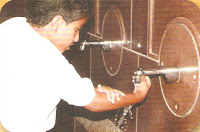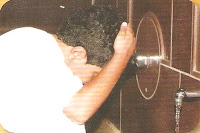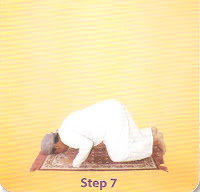1. A Muslim is required to perform daily obligatory
Prayers (Salaat) five times as per the Prayer timings.
2. This leaflet is meant to teach new
Muslims how to perform their five daily Prayers.
3. Before performing a Prayer, first you
need to be in a state of physical (tangible) cleanliness and non-physical
(intangible) cleanliness by performing Tahaara (Purification).
4. When performing Tahaara, you
remove any physical impurities and non-physical impurities. See the section on Tahaara
for the method of removing both physical and non-physical impurities.
5. Once you are purified from physical and non-physical
impurities (i.e. in a state of Tahaara), you still need to perform Ablution
(Wudhuu) in order to perform Prayer. See the section on Wudhuu
for step-by-step instructions on how to perform Wudhuu.
6. Once you have Wudhuu, you are now
ready to perform Prayer. See the section on Prayer for step-by-step
instructions on how to perform daily Prayers.
HOW TO PERFORM TAHAARA
Why Tahaara?
Allah commands Muslims to purify
themselves from all types of impurities before performing certain acts of
worship.
Tahaara in Islam is of two kinds:
1. Purification of “physical
impurity" that is caused when a person passes urine or stool (also called Hadath
L-Asghar) or is in contact with impurity such as urine, stool, blood,
vomit, puke, manee, madhee and wadee.
2. Purification of "non-physical
impurity” that is caused by sexual intercourse and wet dream (Janaaba),
menstrual cycle (Heidh), post natal bleeding (Nifaas).
Allah (swt) says:
“Allah loves those who turn to Him
constantly and He loves those who keep themselves pure and clean.” (Qur’an
2:222)
Prophet Muhammad (saw) said:
“Tahaara is the basis of Faith" (Sahih
Muslim and Bukhari)
Niyyah (Intention)
In Islam, all deeds are considered by their intentions,
thus before making an Tahaara one needs to make an intention in the
heart to take away the state of impurity from your body, clothes, the place
intended for performing prayer for Allah's sake.
FOLLOW THE STEPS
Physical Impurities (Najasa)
‘Najasa’ is an Arabic term for
all physical substances that Islam considers them as impurities that when in
contact with the body, clothes or place where prayer is intended to be
performed, must be removed first before performing prayer (Salaat). Najasa
include the following substances:
Ø Urine: whether from human or animals
Ø Stool: from human and animals except from
animals that are eaten by humans
Ø Blood: all types of blood except blood
from cutting fish or meat
Ø Vomit
Ø Puke: food or liquid that flows back from
the stomach into mouth
Ø Manee: liquid that comes out during sexual
intercourse or wet dream
Ø Madhee: light clear liquid that comes out
during sexual foreplay
Ø Wadee: light white liquid that comes out after
urine
Removal of Najasa
Najasa on the body, clothes or place where prayer is
intended to be performed, (or anything or anywhere for that matter) can be
removed by simply washing off with water. It is not stipulated as to how many
times it must be washed off, except in the case of the physical impurity of a
dog (i.e. its saliva, urine and feces), where it must be washed seven times,
one of which must be done with clean earth (sand or dust). For the rest of Najasa,
they must be washed off with water only, and if some smell or stubborn stains
remain after washing they may be ignored.
Non-Physical Impurities (Hadath L-Akbar)
‘Hadath L-Akbar' is an Arabic
term that refers to the state of non-physical impurity (intangible uncleaness)
that prevents a Muslim from offering prayers and other acts of worship until
that state is removed. Hadath L-Akbar includes the following three
states:
Ø State of ‘Janaaba’- After a
sexual intercourse or after semen emission whether the person is awake or
asleep (wet dream)
Ø State of ‘Heidh’- After the
woman's menstrual cycle
Ø State of ‘Nifaas' - After a
period of woman's post natal bleeding (usually 40 days)
Removal of Hadath L-Akbar
Purifying oneself from the state of Hadath L-Akbar
can be achieved by ritual bathing (Ghusul) which involves pouring clean
water to the entire body. Ghusul is performed in order to validate: Salaat,
Tawaf, Fasting, Touching and Reading the Qur’an, and Entering a Mosque.
Ghusul is needed in the following situations:
Ø After sexual intercourse or after semen emission whether the person is awake or asleep (wet dream)
Ø After woman’s menstrual cycle
Ø After period of woman’s post natal
bleeding
Ø After a non-Muslim reverted to
Islam
Ø When preparing a dead body of a Muslim
for funeral
Ø When suspect having ritual impurity
Ø Every Friday
Ø During the two Muslim Eids
Ø Before entering the state of ‘Ihram’
for Hajj or Umrah
How to Perform Ritual Bathing
Ø Make intention (Niyyah) in your
heart
Ø Passing urine
Ø Wash the private parts (from the navel
to the knees) and any area that come in contact with ritual impurity.
Ø Say Bismillah
Ø Perform Wudhuu as done for prayer
(refer to the Wudhuu section)
Ø Application of water thoroughly to the
entire body
·
Beginning with the upper parts of the body before the lower parts
·
Beginning with the right parts of the body before the
left parts
·
Rub the surface of the body with hand while applying
water
Toilet Etiquette
Ø Enter the toilet with the left foot first and leave the toilet with the
right foot first.
Ø One must not speak in the toilet.
Ø One must not take or read the Qur'an in the toilet.
Ø One must not pass urine while standing.
Ø One must avoid any physical impurities splashed onto the body or
clothes. If this happens accidentally, then one must wash off the affected area
thoroughly with water.
Ø One has to use the left hand for cleaning the private parts.
HOW TO PERFORM WUDHUU
Why Wudhuu?
Performing Ablution (Wudhuu)
before entering into prayer [Salaat) is commanded by Allah (swt)
and His Prophet (saw).
Allah (swt) says:
"0 you who have believed, when you
rise to [perform] Prayer, wash your faces and your forearms to the elbows and
wipe over your heads and wash your feet to the ankles. And if you are in a state
of janabah, then purify yourselves. But if you are ill or on a journey
or one of you comes from the place of relieving himself or you have contacted women
and do not find water, then seek clean earth and wipe over your faces and hands
with it. Allah does not intend to make difficulty for you, but He intends to purify
you and complete His favor upon you that you may be grateful.” [Qur’an 5:6]
Prophet Muhammad (saw) said:
“No Prayer is valid of whoever neglects Ablution.” [Sahib
Bukhari and Sahih Muslim]
Niyyah (Intention)
In Islam, all deeds are considered by their intentions,
thus before making an Ablution one needs to make an intention in the heart to
take away the state of impurity from your body by performing Ablution for
Allah's sake.
FOLLOW THE STEPS
Before start making the Ablution, say:
“بسم الله”
“Bismillah”
Step 1
Wash both hands up to the wrists three
times. Make sure the water reaches all parts of the wrist, including
between the fingers.
Step 2
Using your right hand, put a handful of
water into your mouth and rinse it thoroughly and gurgle in as deep as possible.
Do this three times.
Step 3
Again using the right hand, sniff water into
your nostrils as far in as possible to clean them. Wipe any mucus away with the
left hand, again three times.
Step 4
Using both hands, wash face three times,
wiping from your forehead to your chin and extending your hands to cover your face
from ear to ear.
Step 5
Wash your arm including the elbow three
times starting with your right arm.
Step 6
Wash the left arm including the elbow
three times, as you have done for the right arm.
Step 7
Wipe the head with a wet hand once from
the front to the back.
Step 8
Wipe the inside of your ears using your
wet fingers; at the same time wipe the back of the ear lobes with your thumbs.
Step 9
Wash the right foot including the ankle
three times, passing water between the toes, and over the sole of the foot.
Step 10
Wash the left foot including the ankle three times,
passing water between the toes and over the sole of the foot.
After finishing making the Ablution Say:
أشهد أن لا إله إلا الله وأن
محمداً رسول الله *
اللهم اجعلني من التوابين
واجعلني من المتطهرين*
Ash’hadu
an laa Ilaha Illa Llah wa anna Muhammadan rasuulu Llah
*Allahumma j’alni mina ttawwabyna wa j'alni mina lmutatahhirin.
Actions that Nullify Wudhuu
1. An excretion of the private parts (urine, feces, gas and prostatic
fluids).
2. Sleep that removes consciousness.
3. Loss of consciousness for any reason.
4. To be in contact with the sexual organ or any other ritual impurity.
5. Bleeding, vomiting and puking.
Tayammum
· Tayammum (Dry Ablution) refers to the use of clean earth (sand or dust) to wipe
out one’s face and hands in place of Ablution or purification of minor and major
ritual impurities with the intention of preparing oneself to pray.
· Tayammum is permitted in the Qur'an when one cannot find water. [Qur'an 4:43]
· When
performing Tayammum, one must begin with intention (Niyyah), then
mention “Bismillah”, and finally strike clean soil with hands and wipe
the face and hands up to the wrist.
HOW TO PERFORM SALAAT
Why Salaat?
Performing
regular obligatory Prayers is the second pillar of Islam and has been commanded
by Allah (swt) and His Prophet (saw).
Allah (swt) says:
“Recite, [O Muhammad], what has been
revealed to you of the Book and establish Prayer. Indeed, Prayer prohibits
immorality and wrongdoing, and the remembrance of Allah is greater. And Allah knows
that which you do.” [Qur’an 29:45]
Prophet Muhammad (saw) said:
"Whoever doesn't pray is not a Believer.”
“What lies between a Believer and disbelief is renouncement
of Prayer.”
[Sahih Bukhari and Sahih Muslim]
Niyyah (Intention)
In Islam, all deeds are considered by
their intentions, thus before entering state of Prayer one needs to make an intention
in the heart the desire to pray in obedience to Allah (swt)
To perform Prayer, stand on a clean
place facing the direction of Qibla ready to begin.
FOLLOW THE STEPS
Step 1: Preparation (lsti’daad)
Recite ‘Iqamah’ (see Remark 1)
Recite ‘Tawjih’
Say: “Allah Akbar”
Say: “Audhu Billahi Mina Shaytani
Rrajiym”
Step 2: Standing (Qiyaam)
Recite: سورة الفاتحة
Surah ‘Fatiha’ (see Remark 1)
*Upon bowing say: “Allahu Akbar”
Step 3: Bowing (Rukuu)
Say: “سبحان ربي العظيم”
3 مرات
“Subhana
Rabbiya I’Adhim” 3 times
*Upon standing say: “Samia llahu liman hamidah”
Step 4: Standing (Qiyaam)
Say: “ربنا ولك الحمد”
“Rabbana walaka I’Hamd”
*Upon prostrating say: “Allahu Akbar”
Step 5: 1st Prostrating (Sujuud)
Say: “سبحان ربي الأعلى”
3 مرات
“Subhana
Rabbiya I’Aala” 3 times
*Upon sitting say: “Allahu Akbar”
Step 6: Sitting (Juluus)
Stay silently in this position for 3-4
seconds
*Upon prostrating say: “Allahu Akbar”
Step 7: 2nd Prostrating (Sujuud)
Say: “سبحان ربي الأعلى”
3 مرات
“Subhana
Rabbiya I’Aala” 3 times
*Upon standing say: “Allahu Akbar”
Step 8: Standing (Qiyaam)
Recite: سورة الفاتحة
Surah ‘Fatiha’ (see Remark 2)
*Upon bowing say: “Allahu Akbar”
Step 9: Bowing (Rukuu)
Say: “سبحان ربي العظيم”
3 مرات
“Subhana
Rabbiya I’Adhim” 3 times
*Upon standing say: “Samia llahu liman hamidah”
Step 10: Standing (Qiyaam)
Say: “ربنا ولك الحمد”
“Rabbana walaka I’Hamd”
*Upon prostrating say: “Allahu Akbar”
Step 11: 1st Prostrating (Sujuud)
Say: “سبحان ربي الأعلى”
3 مرات
“Subhana
Rabbiya I’Aala” 3 times
*Upon sitting say: “Allahu Akbar”
Step 12: Sitting (Juluus)
Stay silently in this position for 3-4
seconds
*Upon prostrating say: “Allahu Akbar”
Step 13: 2nd Prostrating (Sujuud)
Say: “سبحان ربي الأعلى”
3 مرات
“Subhana
Rabbiya I’Aala” 3 times
*Upon sitting say: “Allahu Akbar”
Step 14: Sitting (Juluus)
Recite: التحيات
‘Tahiyat’ (see Remarks 3 & 4)
Step 15: Saluting (Salaam)
Turn your face to the right
Say: السلام عليكم Assalam
Alaykum
Step 16: Saluting (Salaam)
Turn your face to the left
Say: ورحمة الله Wa
Rahmatu Llah
Steps for Performing Five Daily Obligatory Prayers
|
|||
PRAYER
|
RAKAAT
|
STEPS
|
REMARKS
|
FAJR
|
2
|
1-16
|
1. ‘Iqamah’ in Step 1 is not required for
females anytime, or for males when praying in congregation.
2. When praying individually (male and female),
recite Surah ’nNas' (or any other small Surah) after Surah ‘Fatiha'
in Step 2 and Surah ’lkhlas' (or any other small Surah) after Surah 'Fatiha’
in Step 8 for FAJR, MAGHRIB and ISHA Prayers.
3. Say:"Allahu Akbar” upon standing from
Step 14 for DHUHR, ASR, MAGHRIB and ISHA Prayer.
4. For FAJR Prayer, recite ‘Tahiyat A’ and 'Tahiyat
B’ in Step 14. For all other Prayers, recite 'Tahiyat A' in the first
Sitting (Juluus) in Step 14 and ’Tahiyat A’ and 'Tahiyat
B’ in the second Sitting (Juluus) in Step 14.
|
DHUHR
|
4
|
1-14, 2-16
|
|
ASR
|
4
|
1-14, 2-16
|
|
MAGHRIB
|
3
|
1-14, 8-16
|
|
ISHA
|
4
|
1-14, 2-16
|
|
Iqamah
الله
أكبر (4 مرات)
أشهد
أن لا إله إلا الله (مرتين)
أشهد
أن محمداً رسول الله (مرتين)
حي
على الصلاة (مرتين)
حي
على الفلاح (مرتين)
قد
قامت الصلاة (مرتين)
الله أكبر الله أكبر، لا إله إلا الله
Allahu
Akbar, Allahu Akbar (2x)
Ash’hadu
an laa illaha illa Llah (2):)
Ash’hadu
anna Muharnmadan rasulu Llah (2x)
Hayya
ala Salaa (2x)
Hayya
aia Falah (2x)
Qad
qaamati Salaa (2x)
Allahu
Akbar, Allahu Akbar
Laa
illaha illa Llah.
Tawjih
سبحانك اللهم وبحمدك * تبارك اسمك * وتعالى جدك * وجل ثنائك * ولا إله غيرك
* إني وجهت وجهي * للذي فطر السموات والأرض * حنيفاً وما أنا من المشركين *
Subhanaka
Llahumma wa bihamdika *
Tabaaraka ismuka * Wa taala jadduka * Wa jalla thanaauka * Wala illaha ghayruka
* Inni wajjahtu wajhiya * Lilladhiy fatara ssamaawati wal’ardhi * hanifan wa
ma'ana mina l’mushrikin *
Tahiyat A
التحيات المباركات لله والصلوات الطيبات * السلام عليك أيها النبي ورحمة
الله وبركاته * السلام علينا وعلى عباد الله الصالحين * أشهد أن لا إله إلا الله وأشهد
أن محمداً عبده ورسوله *
Attahiyaatu
lmubarakaatu lillahi wa ssalawaatu wa ttayyibaatu * Assalamu alayka ayyuha nnabiyyu wa
rahmatu llahi wa barakatuh * Assalamu alayna wa alaa ibadi llahi ssaalihin *
Ash'hadu an la illaha illa Llah wa ash'hadu anna Muhammadan abduhu wa rasuluhu.
Tahiyat B
اللهم صل على محمد وعلى أل محمد * كما صليت على إبراهيم وعلى آل إبراهيم *
وبارك على محمد وعلى آل محمد * كما باركت على إبراهيم وعلى آل إبراهيم * في
العالمين إنك حميد مجيد*
Allahumma ssalli ala Muhammad wa alaa aali
Muhammad * kama salayta ala Ibrahim wa alaa aali Ibrahim * wa barik alaa
Muhammad wa alaa aali Muhammad * kama barakta alaa Ibrahim wa alaa aali Ibrahim
* fil alamina innaka hamidunmajiid *
Surah
‘Fatiha’
بسم
الله الرحمن الرحيم
الحمد لله رب العالمين * الرحمن الرحيم *
مالك يوم الدين * إياك نعبد وإياك نستعين * اهدنا الصراط المستقيم * صراط الذين
أنعمت عليهم غير المغضوب عليهم ولا الضالين *
Bismillahi Rrahmani Rrahim
Alhamdu lillahi Rabbi l’aalamin * Arrahmaani Rrahim * Maaliki yaumidiin
*
Iyaaka na abudu wa iyaka nastaiin * Ihdina
ssiratal mustaqiim * Ssiraata ladhina an’amta alaihim * Ghayri l’maghdhuubi
alayhim wala dhaaliin *
Surah
‘Nnas’
بسم
الله الرحمن الرحيم
قل أعوذ
برب الناس * ملك في صدور الناس * من الجنة والناس *
الناس * إله الناس * من شر الوسواس الخناس * الذي يوسوس
Bismillahi Rrahmani Rrahim
Kul
audhu birabbi nnaas * Maliki nnaas * Ilahi nnaas * Minsharri lwaswaasi
lkhannaas * Alladhi yuwaswisu fi suduuri nnaas * Mina ljinnati wa nnaas *
Surah
‘Ikhlas’
بسم
الله الرحمن الرحيم
قل هو الله أحد * الله الصمد * لم يلد ولم يولد * ولم يكن له كفواً أحد *
Bismillahi Rrahmani Rrahim
Kul
huwa Llahu Ahad * Allahu Ssamad * Lam yalid walam yuulad * Walam yakun lahu kufuwan
Ahad *
Supplication After Prayer
Ø
أستغفر
الله x3
Ø
اللهم
أنت السلام، ومنك السلام، تباركت يا ذا الجلال والإكرام
Ø
لا
إله إلا الله وحده لا شريك له، له الملك وله الحمد وهو على كل شيء قدير
Ø
اللهم
صل وسلم وبارك على سيدنا محمد وعلى آل سيدنا محمد كما صليت وسلمت وباركت على سيدنا
إبراهيم وعلى آل سيدنا إبراهيم في العالمين إنك حميد مجيد
Ø
ربنا
تقبل منا صلاتنا وأجب لنا دعواتنا وإرحمنا إنك أنت أرحم الرحمين
Ø
ربنا
آتنا في الدنيا حسنة وفي الآخرة حسنة وقنا عذاب النار
Ø Astaghfiru Llah x3
Ø Allahumma anta salaam, wa minka salaam,
tabaarakta ya dha ljalali wa l-ikram
Ø La ilaha illa Llah, wahdahu la sharika lahu,
lahu lmulk, wa lahu lhamd, wa huwa ala kulli shayin qadyir.
Ø Allahumma ssali wassalim wa baarik ala
sayyidna Muhammad, wa ala aali sayyidna Muhammad, kama sallayta wa sallamta wa
barrakta ala sayyidna Ibrahim, wa ala aali sayyidna Ibrahim, fil aalamina innaka
hamidun majid
Ø Rabbana taqabbal minna salaatana, wa ajib
lana daawatana, wa arrhamna, innaka anta arrhamu rrahimin
Ø Rabbana aatina fi dunya hassanat, wa fil
akhirati hassanat, wa qina adhaaba naar
May continue supplications in your own language
Actions that Invalidate Prayer
1. Eating or drinking in Prayer.
2. Speaking about something unrelated to Prayer.
3. Smiling and laughing during Prayer.
4. Leaving out essential act or condition of Prayer such as ablution.
5. Making many unrelated motions.
For more information refer to relevant
books on Prayer.
Reference:
Salaat Simplified (Guide for New Muslims), By Islamic
Information Center IIC.




























No comments:
Post a Comment